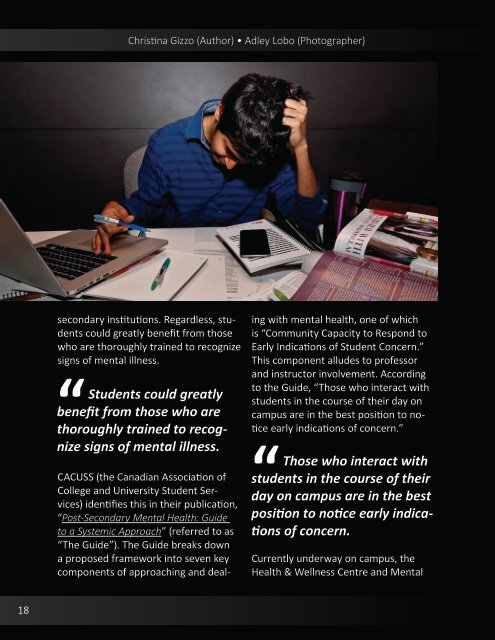Volume 1, Issue 1: Post-Secondary Mental Health
Create successful ePaper yourself
Turn your PDF publications into a flip-book with our unique Google optimized e-Paper software.
Christina Gizzo (Author) • Adley Lobo (Photographer)<br />
secondary institutions. Regardless, students<br />
could greatly benefit from those<br />
who are thoroughly trained to recognize<br />
signs of mental illness.<br />
“<br />
Students could greatly<br />
benefit from those who are<br />
thoroughly trained to recognize<br />
signs of mental illness.<br />
CACUSS (the Canadian Association of<br />
College and University Student Services)<br />
identifies this in their publication,<br />
“<strong>Post</strong>-<strong>Secondary</strong> <strong>Mental</strong> <strong>Health</strong>: Guide<br />
to a Systemic Approach” (referred to as<br />
“The Guide”). The Guide breaks down<br />
a proposed framework into seven key<br />
components of approaching and dealing<br />
with mental health, one of which<br />
is “Community Capacity to Respond to<br />
Early Indications of Student Concern.”<br />
This component alludes to professor<br />
and instructor involvement. According<br />
to the Guide, “Those who interact with<br />
students in the course of their day on<br />
campus are in the best position to notice<br />
early indications of concern.”<br />
“<br />
Those who interact with<br />
students in the course of their<br />
day on campus are in the best<br />
position to notice early indications<br />
of concern.<br />
Currently underway on campus, the<br />
<strong>Health</strong> & Wellness Centre and <strong>Mental</strong><br />
Christina Gizzo (Author) • Adley Lobo (Photographer)<br />
<strong>Health</strong> Network at UTSC are considering<br />
training tools that will be most<br />
effective for students, staff, and faculty<br />
when it comes to learning how to support<br />
students attending post-secondary<br />
institution. They are looking into implementing<br />
a training tool from morefeetontheground.ca<br />
for faculty, staff, and<br />
students to use as of the fall of 2015.<br />
The objective of this training tool is to<br />
help clarify the definitions of certain<br />
mental health conditions, and help individuals<br />
to recognize, respond, and refer<br />
when needed.<br />
On a similar note, CACUSS <strong>Post</strong>-<strong>Secondary</strong><br />
<strong>Mental</strong> <strong>Health</strong> Community of<br />
Practice recently sent out a survey to<br />
Student Services to gauge familiarity<br />
and comprehension of The Guide. Preliminary<br />
results of the survey were presented<br />
at a CACUSS conference in May<br />
with next steps underway, says Basma<br />
Chamas, a fifth year student at UTSC<br />
who sits on one of the CACUSS committees.<br />
Likewise, Mary Nguyen, a fourth year<br />
student at UTSC, claims that staff<br />
and faculty training on mental health<br />
would promote student mental health<br />
and overall well-being. She says that<br />
it would also send the message that<br />
mental well-being should be prioritized,<br />
especially since a student’s undergraduate<br />
career and postgraduate aspirations<br />
can be heavily influenced by staff and<br />
faculty.<br />
“<br />
Staff and faculty training<br />
on mental health would promote<br />
student mental health<br />
and overall well-being.<br />
Of course, it’s not only about staff,<br />
student, and faculty contributions. On a<br />
large scale, we need the university itself<br />
to incorporate student mental well-being<br />
as a priority in its policies; CACUSS<br />
has also identified a need for a systemswide<br />
approach to creating a campus environment<br />
that is conducive to mental<br />
health and learning. Such an approach<br />
would hold the University accountable,<br />
campus wide, for enhancing and<br />
maintaining the mental health of community<br />
members. Further, using such<br />
an approach would extend the focus of<br />
mental health dissemination beyond the<br />
individual (i.e., strategies such as treatment<br />
and skill-building) to the whole<br />
campus (i.e., considering environment,<br />
organizational structure, policies, and<br />
practices) [3].<br />
The University of Toronto’s Institutional<br />
Commitment emphasizes the importance<br />
of adjustments to course design<br />
and curriculum, but there still remain<br />
some issues with the current standard:<br />
“Professors can better accommodate<br />
students with mental illness by evaluating<br />
the limitations of their syllabus. In<br />
terms of participation marks, for example,<br />
it can be limiting to those who have<br />
social anxiety or panic attacks to be put<br />
18<br />
19






